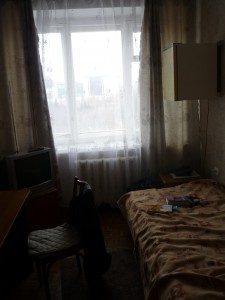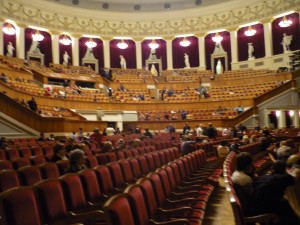Dec. 11 – Kazan
“Migration ticket.”
The hotel clerk has seen my passport, and now wants a document I no longer have – the slip of paper I filled in when I entered Russia, and which was stamped by the border authorities. No idea I still needed it – my other Russian hotels had not asked. As I search my bags in vain, a tall, bearded, Belgian backpacker enters the lobby. He still has his migration ticket. A brief discussion later, he books a double room and we split the cost. It’s only for one night, which means moving on to Moscow a day earlier than planned. Not a problem.
I like hybrid places where cultures intersect, like Kazan. Perched where the Volga and Kazan Rivers meet in the Russian Republic of Tatarstan, Kazan fuses Christianity and Islam, and Russians with ethnic Tatars. Crescent-tipped minarets and cross-topped church towers point skyward. Street signs are bilingual – Tatar above Russian to make a point.
The Belgian is a civil engineer heading home after a job in Cambodia. We walk Kazan’s frozen streets gingerly – each of us falling down hard once apiece. Workers strew sand and chop at the ice, but we wonder how old people get around. Other workers shovel snow off the roofs. It cascades lumpily onto cordoned-off areas below. With one wary eye on the treacherous, icy pavement, we wander around a city rolling in petrorubles. Kazan’s wealth is obvious in its many elegant, pastel-plastered buildings, new or being refurbished. I’m impressed, despite a cold wind that has us seeking warmth in a shopping mall, a church, a mosque, a museum, a café, and a restaurant over the course of the day. Kazan’s focal point is its great, white-walled Kremlin. It is a UNESCO heritage site containing a stunning new mosque and a stunning old church, both with azure-blue domes. On
streets gingerly – each of us falling down hard once apiece. Workers strew sand and chop at the ice, but we wonder how old people get around. Other workers shovel snow off the roofs. It cascades lumpily onto cordoned-off areas below. With one wary eye on the treacherous, icy pavement, we wander around a city rolling in petrorubles. Kazan’s wealth is obvious in its many elegant, pastel-plastered buildings, new or being refurbished. I’m impressed, despite a cold wind that has us seeking warmth in a shopping mall, a church, a mosque, a museum, a café, and a restaurant over the course of the day. Kazan’s focal point is its great, white-walled Kremlin. It is a UNESCO heritage site containing a stunning new mosque and a stunning old church, both with azure-blue domes. On the Kremlin’s rampart, a newly-married couple shivers as their photographer takes pictures. The maid of honour, huddled in her coat, holds the bouquet.
the Kremlin’s rampart, a newly-married couple shivers as their photographer takes pictures. The maid of honour, huddled in her coat, holds the bouquet.
I book a cheap, third-class ticket for the 13 hour overnight journey to Moscow. It means less space, but it’s only one night unlike my other rail trips thus far. Turns out it’s not so bad. It’s a new wagon, not full, passengers chatting quietly, playing cards, eating dinner. Across from me is a young, slight man with longish black hair. He speaks some English, slides his Russian passport across the table to me. It says he was born in Afghanistan in 1983. He apologizes for only having one bottle of Miller Genuine Draft, and says;
“I don’t drink very much. But today I am sad.”
I don’t press. If he wants to say more, he will. He’s studying Economics in Moscow, also speaks Farsi and Hindi in addition to Russian. He would like to learn more French. A plaintive look comes over his face.
“Why did you come here? Canada is a good place. You should go there.”
In the night, we’re joined by a Moldovan man, and later, by a farmer woman, complete with thick forearms and head cloth. I get the top bunk and manage five hours’ sleep as we roll towards Moscow.


![P1020026[1]](http://www.patrickokens.com/wp-content/uploads/2011/12/P10200261-300x225.jpg)
